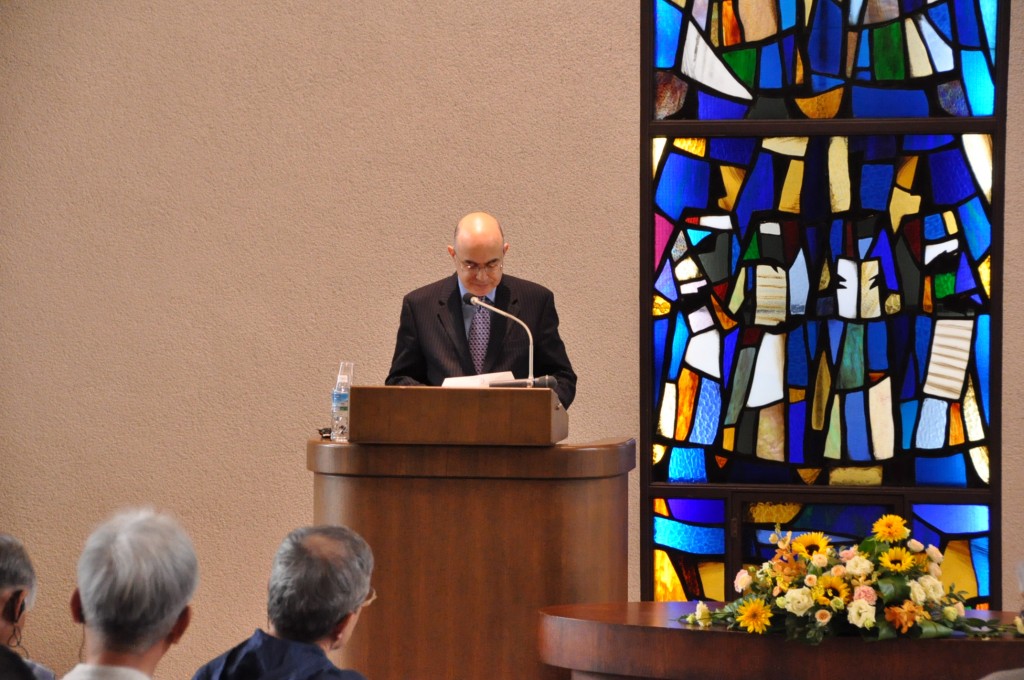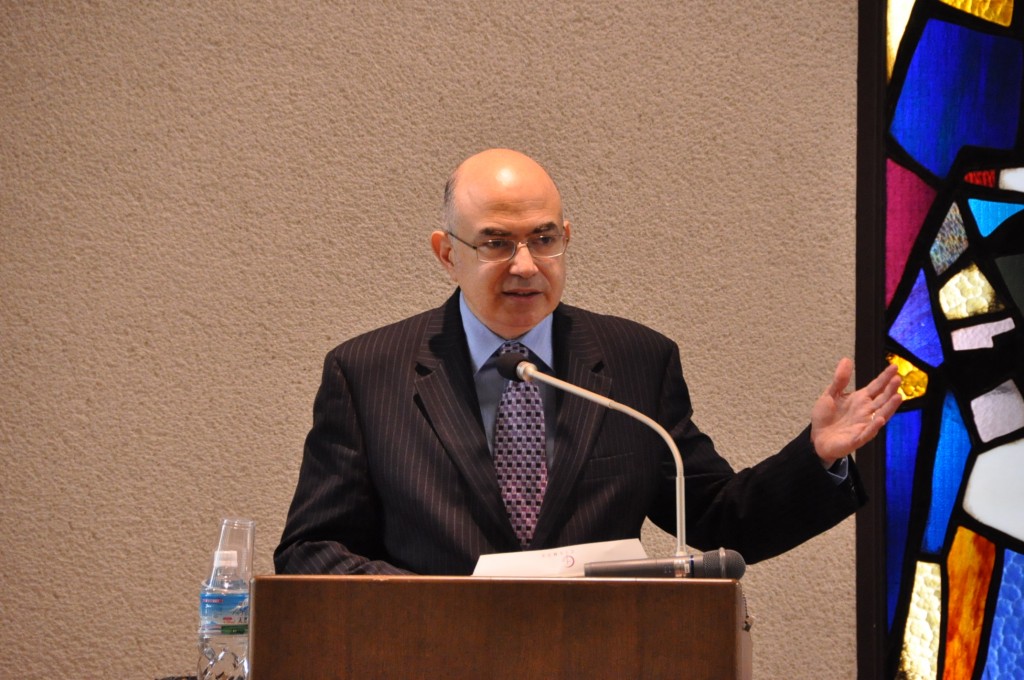Center for Interdisciplinary Study of Monotheistic Religions(CISMOR)Doshisha University
> Public Lectures > Changing Egypt and ReligionPublic Lectures
Open Lecture by Project1
Changing Egypt and Religion
| Date: |
2011/06/11 13:00 − 15:20 |
|---|---|
| Place: | Divinity Hall Chapel, Imadegawa Campus, Doshisha University |
| Lecture: | H. E. Dr. Walid Mahmoud ABDELNASSER, Ambassador of the Arab Republic of Egypt |
| Summary: | |
|
His Excellency Dr. Abdelnasser, ambassador of the Arab Republic of Egypt, discussed a wide range of topics in his lecture, from the religion of ancient Egypt to Islam, and from the present state of Egypt to its Middle East diplomacy, as he is an expert in politics and diplomacy and has profound knowledge of religious issues. This lecture was especially significant in that he looked back on the Egyptian revolution that occurred in January 2011 in conjunction with religions in Egypt. Since ancient times, religion has been an important part of the lives of the Egyptian people. It is evident from the ancient ruins of the Nile civilization that the power of religion was behind both this country’s ancient society and the inner psychological world of Egyptians. Though the ancient religion no longer has any believers, many religions exist in today’s Egyptian society. Currently, Muslims account for about 90% of the Egyptian population, and most of them are Sunni Muslims. Egyptians have faith in various other religions, including the Coptic Church, which was founded by St. Mark the Apostle in the first century and which separated from the Roman Empire in the fifth century. The Coptic Church has continued to have a huge influence on society throughout the history of Egypt—it has remained so even after Muslims came to constitute the majority of the Egyptian population. However, no serious conflicts occurred between Muslims and Coptic Christians, who have lived together in peace and harmony, sharing the same history and identity as Egyptian citizens. During the modernization process of Egypt, Muslims and Coptic Christians acted in unison and contributed to the establishment of the modern state of Egypt. Such interfaith cooperation was also seen in the resistance to the British occupation and the revolutionary movement to overthrow the Egyptian monarchy. However, the political uncertainty after the revolution sometimes caused them to collide with each other. Especially, the Palestinian problem has adversely affected the relationships between Muslims and Coptic Christians to not a small extent. The Sadat administration established in 1970 introduced Islamic doctrine to the political realm. While Nasser maintained a religiously neutral stance, Sadat changed direction to allow conservatives including Islamists to join politics in order to strike a political balance between left and right. However, Sadat’s policy toward Israel aroused distrust among Islamists and caused them to stand against the government. At the same time, the Coptic Christians were opposed to the government for having introduced Islamism to politics and began to take action to call for policies of tolerance and diversity and to claim equal rights in politics and society. Thus, the political problem that faced Egypt in the 1970s transformed itself into a religious problem, causing the conflict between Muslims and Coptic Christians to rise to the surface from time to time. Clearly, there has been a growing voice for freedom of expression and dialogue since the Egyptian revolution of January 25 when public dissatisfaction with the dictatorial regime first erupted. Egyptian people have become more aware of civil rights issues, and now heated discussions are underway from different angles among Muslims and Coptic Christians. The main topic of such discussions is Article 2 of the Constitution of Egypt, which is an important provision concerning Egypt’s religion—this article provides that Islam is the religion of the state and that the principal source of legislation is Islamic jurisprudence (Sharia). At the same time, the constitution prohibits forming political parties based on religion. At present, however, a great deal of controversy is surrounding this constitution, and whether it will be maintained or not depends largely on the results of the parliamentary and presidential elections scheduled for September and November 2011, respectively. In Egyptian society after the revolution, people in many parts of the country have come to share their identity as Egyptian citizens and work together to protect their communities and maintain peace without regard to differences in religious affiliation. Such a change in attitude on a grassroots level stems from the shared identity of being Egyptian and from the sense of value held by their respective religions. Currently, Egypt is in the process of national reconstruction after the revolution, and Egyptians will thus be facing a lot of resulting problems, such as unemployment, rising food prices, and low wages. Hopefully, the leaders of the revolution who stood together against the government despite religious differences will continue to work in cooperation to build a new Egypt. Souki Yamashita (Research Assistant, Graduate Student of School of Theology, Doshisha University) |
|
|
*This lecture will be given in English. *Admission Free. Co-hosted by: School of Theology, Doshisha University |
|
|
Program(Japanese) |
|

